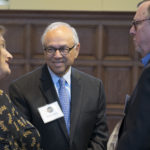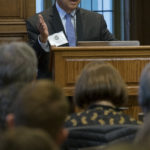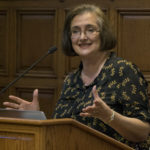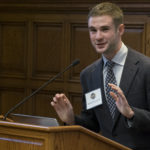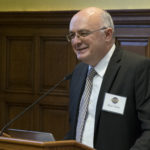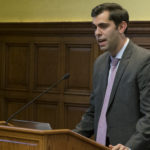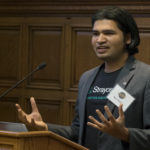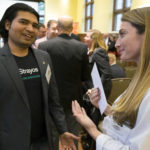Two new Global Impact Award (GIA) winners have been selected. The $50,000 award will be split evenly between Geneoscopy and Strayos.
 Geneoscopy’s novel method to extract RNA biomarkers from stool enables a new wave of noninvasive diagnostic tests to prevent, detect, and treat gastrointestinal (GI) disease.
Geneoscopy’s novel method to extract RNA biomarkers from stool enables a new wave of noninvasive diagnostic tests to prevent, detect, and treat gastrointestinal (GI) disease.
Strayos helps mining and quarry engineers acquire site data for material extraction. Their proprietary 3D photogrammetry software eliminates the need for expensive laser scanners by automating site data collection. They use drone data to provide real-time 3D analytics, predicting efficient and accurate blast patterns while significantly decreasing delivery time and improving safety measures.
They join the ranks of past winners, Nanopore Diagnostics (2014), ViFlex (2014), Applied Particle Technology (2015), and Epharmix (2016).
The GIA competition awards Washington University students, postdoctoral researchers, and recent alumni whose ventures are scalable, sustainable, and quick-to-market with proof of concept and a broad impact. It is hosted by the Skandalaris Center for Interdisciplinary Innovation and Entrepreneurship (Skandalaris Center), and it is made possible by the generous donation of alumnus Suren G. Dutia and his wife, Jas K. Grewal.
The Skandalaris Center helps the teams as they prepare for the finals. “We are delighted with the record levels of engagement with the Global Impact Award by our students, former participants, mentors and the entrepreneurial community at large,” explains Emre Toker, Managing Director for the Skandalaris Center.
- Grewal (left) and Dutia talk with former Skandalaris Center director Ken Harrington. Photo by Sid Hastings / WUSTL Photos
- Suren G. Dutia delivers remarks during the event. Photo by Sid Hastings / WUSTL Photos
- Jas K. Grewal delivers remarks during the event. Photo by Sid Hastings / WUSTL Photos
- Blake Marggraff, 2016 winner with the firmer Epharmix, delivers remarks during the event. Photo by Sid Hastings / WUSTL Photos
- Emre Toker, director of the Skandalaris Center, delivers remarks during the event. Photo by Sid Hastings / WUSTL Photos
- Andrew Barnell, CEO of Geneoscopy, makes his elevator pitch during the event. Geneoscopy was one of two companies to receive an award. Photo by Sid Hastings / WUSTL Photos
- Ravi Sahu, of Strayos, makes his elevator pitch during the event. Strayos was one of two companies to receive an award. Photo by Sid Hastings / WUSTL Photos
- Ravi Sahu (left) of Strayos talks with Erica Barnell of Geneoscopy during the reception following the event. Strayos and Geneoscopy were the two ventures to receive awards. Photo by Sid Hastings / WUSTL Photos
“We were pleased with the quality of the presentations and diversity in the sectors the companies represented this year,” the donors observed, “It was clear that those finalists that took advantage of the mentoring component, unique to our competition, benefited greatly in propelling their ventures forward. We are confident that our two winning teams have tremendous promise for high probability of success.”
The mentorship that the donors reference is a key component of GIA. After the finalists were selected and announced in April, they worked with hand-selected mentors to refine their ventures and pitches.
“GIA mentorship was the key part for Strayos’ strong foundation to prepare for the finals,” founder and CEO, Ravi Sahu, commented, “Mentors bring unique insights and have true understanding of the gaps which we as entrepreneurs sometimes overlook.”
Andrew Barnell, CEO and co-founder of Geneoscopy, echoed Sahu’s comments, “The mentorship we received as part of [GIA] helped us recognize the full value proposition of our technology. As a result, we were able to enter several new markets, which has better positioned the company for success.”
Both teams’ founding members have Washington University roots. Geneoscopy’s team has ties to the School of Medicine and the School of Engineering and Applied Science (SEAS). Strayos has ties to Olin Business School and SEAS.
[Learn more about Geneoscopy’s founding team; learn more about Strayos’ founding team]
Each of the winning teams will receive $25,000 in equity-free funding. Barnell says the funding “will support growth and development in two of [our] new markets: animal health and companion diagnostics.”
Sahu explains that their award will support hiring plans, their global launch in Australia and Asia, and a collaboration with Washington University’s Computer Science department “to build novel algorithms for big data image processing.”
GIA continues to grow in size and impact each year. Toker concludes, “All of us are excited to see the GIA become an established Washington University entrepreneurial tradition within four short years and look forward to working more with past, current and future participants.”


